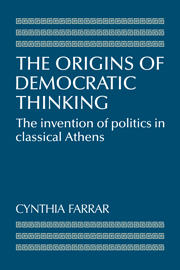Book contents
- Frontmatter
- Contents
- Dedication
- Preface
- 1 Ancient reflections: a force for us
- 2 Order in autonomy: the ungoverned cosmos and the democratic community
- 3 Protagoras: measuring man
- 4 Man's measurings: cosmos and community
- 5 Thucydides: reflecting history – man and the community
- 6 Democritus: reflecting man – the individual and the cosmos
- 7 Living democracy?
- Bibliography
- Indexes
3 - Protagoras: measuring man
Published online by Cambridge University Press: 23 October 2009
- Frontmatter
- Contents
- Dedication
- Preface
- 1 Ancient reflections: a force for us
- 2 Order in autonomy: the ungoverned cosmos and the democratic community
- 3 Protagoras: measuring man
- 4 Man's measurings: cosmos and community
- 5 Thucydides: reflecting history – man and the community
- 6 Democritus: reflecting man – the individual and the cosmos
- 7 Living democracy?
- Bibliography
- Indexes
Summary
From the perspective of a modern scholar, the sophist Protagoras resembles the world postulated by his infamous doctrine that man is the measure of all things: he himself is a collocation of appearances. The problem is not merely that Protagoras' appearances are mediated by observers whose perceptions are indirect or, as it seems to us, sharply angled, but also that these appearances are disjointed. Should we link the Platonic bits of Protagoras in the way that Plato has done? Do we have any choice? Despite his fragmentary persona, Protagoras has long been identified as a political thinker. The fragments from sources other than Plato hint at the existence of intellectual projects rather different from those of Plato – and indeed from those implicitly attributed to the Sophist in the Platonic dialogues. There is good reason to believe that although Protagoras is made to answer Platonic questions, nevertheless the answers (especially the Great Speech in the Protagoras, probably written in the 390s or 380s, and the Defense of Protagoras in the Theaetetus, a dialogue written in the same period as the Republic, in the 360s or so) contain material which does not correspond to the issue under discussion, but rather to earlier and differently-conceived political concerns. To reassemble the historical Protagoras it is necessary to restore him to the proper context, namely Athens during the years when radical democracy developed and was consolidated.
- Type
- Chapter
- Information
- The Origins of Democratic ThinkingThe Invention of Politics in Classical Athens, pp. 44 - 98Publisher: Cambridge University PressPrint publication year: 1988



